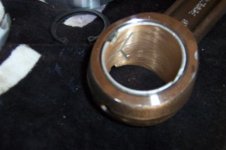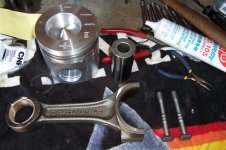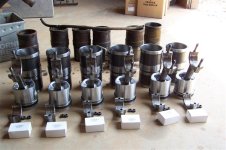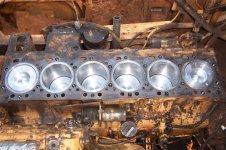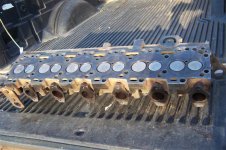RobJ
Elite Member
</font><font color="blue" class="small">( I'm reusing the head bolts and haven't ever heard you shouldn't, so they're keepers. /forums/images/graemlins/smile.gif
Everything seems simple enough to me now, except for the valve timing. Finding TDC for each cylinder seems kind of tricky and I'm hoping the valves opening and closeing as I turn the crank will be fairly obvious.
The only time I've adjusted valves is on a VW in highschool, and it was always running at the time.
)</font>
I would not replace the head bolts but interestingly enough I recently replaced the head gaskets on my sons 3.8 v6 mustang. They say to replace the bolts because they are stretch bolts. Preload with a few ftlbs then turn so many degrees in stages. Just like some of the diesels I worked on.
On setting the valves, your firing order should be 153624(probably on the block....15 to young, 36 to old, 24 just right /forums/images/graemlins/grin.gif) You can set the valves by turning the engine over twice(2 rotations). Find TDC on number 1, set the valves, turn the engine over 120 degrees(2 turns total, 360 degrees * 2 = 720 degrees, 720 divided by 6 = 120...if my math is correct). Set number 5, then another 120 degrees then number 3 and so on. Not to bad on a 6 cylinder but on a 12 cylinder I only had to turn it 60 degrees to get to the next cylinder.
Good Luck!
Everything seems simple enough to me now, except for the valve timing. Finding TDC for each cylinder seems kind of tricky and I'm hoping the valves opening and closeing as I turn the crank will be fairly obvious.
The only time I've adjusted valves is on a VW in highschool, and it was always running at the time.
)</font>
I would not replace the head bolts but interestingly enough I recently replaced the head gaskets on my sons 3.8 v6 mustang. They say to replace the bolts because they are stretch bolts. Preload with a few ftlbs then turn so many degrees in stages. Just like some of the diesels I worked on.
On setting the valves, your firing order should be 153624(probably on the block....15 to young, 36 to old, 24 just right /forums/images/graemlins/grin.gif) You can set the valves by turning the engine over twice(2 rotations). Find TDC on number 1, set the valves, turn the engine over 120 degrees(2 turns total, 360 degrees * 2 = 720 degrees, 720 divided by 6 = 120...if my math is correct). Set number 5, then another 120 degrees then number 3 and so on. Not to bad on a 6 cylinder but on a 12 cylinder I only had to turn it 60 degrees to get to the next cylinder.
Good Luck!
